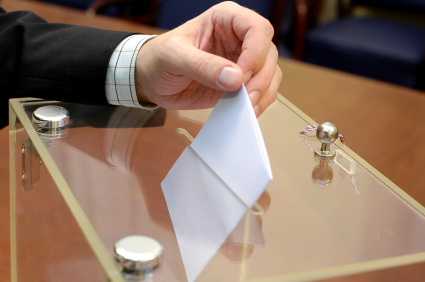Poll: California's Independents weigh in

The December 2010 statewide survey of Californians by the Public Policy Institute of California (PPIC) provides an in-depth look at the opinions and perceptions of the state’s Independent voters as we head into the new year.
Published earlier this month on the basis of interviews with over 2,000 California voters, the political affiliations of the poll’s respondents roughly mirror official registration numbers in the state at large: 45% Democrat, 34% Republican and 20% Independent, with 1% in support of another party. (Official registration numbers released earlier this year revealed that the California electorate is 44.5% Democrat, 30.7% Republican, 20.1% Independent and 4.5% third party.) Asked whether they lean more toward the Democratic Party or the Republican Party, 37% of Independents told the PPIC that they were closer to the Democrats, while 30% said they lean toward the Republicans, and 31% volunteered that they do not think of themselves as closer to one or the other.
The wide-ranging poll surveyed opinion on the November 2010 general election, a number of the state’s nine ballot propositions, the initiative process itself, the political climate at the state and national level, and attitudes toward state and federally elected officials. According to the survey, Independents propelled Jerry Brown and Barbara Boxer to double-digit wins over their Republican rivals. As the PPIC reports:
“In the governor’s race, Democrat Brown beat Republican Meg Whitman by 13 points (54% to 41%) with the support of 86% of Democrats and 56% of Independents.” Similarly, the poll found, “Boxer was re-elected to her US Senate seat by 10 points (52% to 42%) with the support of most Democrats (86%) and Independents (53).”
With regard to the November 2010 ballot propositions, Independents supported Proposition 19, the marijuana legalization initiative, 55% to 45%; they opposed Proposition 23, which would have suspended California’s air pollution control law, 36% to 64%; and they supported Proposition 25, which requires a simple majority in the state legislature to pass a budget, 57% to 43%.
On many issues, the opinions of Independents track very closely with those of Democrats and Republicans, revealing a transpartisan consensus critical of the political and economic status-quo. 59% of Independents, 62% of Republicans and 68% of Democrats state that jobs and the economy are the most important issues facing the people of California today. Similarly, large majorities of Independents, Democrats and Republicans disapprove of Arnold Schwarzenegger’s handling of the state's governorship. The state legislature fared even worse. Only 18% of Democrats, 6% of Republicans and 9% of Independents approve of the way that the California legislature is handling its job.
These approval numbers correlate closely with attitudes toward the state government in general. 66% of Independents, 70% of Democrats and 69% of Republicans said that the state government in Sacramento can be trusted “to do what is right” only some of the time. In the same vein, a majority of Democrats, Republicans and Independents agree that “people in state government waste a lot of the money we pay in taxes.” On this score, it is noteworthy that Californians are losing trust in one another, let alone elected officials. Though a slim majority of Democrats state that they have at least a fair amount of trust and confidence in California’s voters “when it comes to making public policy at the ballot box,” a majority of Republicans and Independents have little or no such trust and confidence in their fellow citizens. According to the PPIC, this marks the first time in a statewide survey that less than half of all respondents had at least a fair amount of confidence in the state’s electorate.
The opinions of Independents appear to diverge most strikingly from those of Democrats and Republicans on issues that polarize supporters of the major parties. For instance, while 82% of Democrats approve of Barack Obama’s handling of the presidency and 83% of Republicans disapprove of the same, Independents are more conflicted than their partisan counterparts. 54% approve of the job the president is doing, while 42% disapprove. On the other hand, majorities of Democrats (60%) and Republicans (87%) disapprove of the way the US Congress is handling its job, as do a majority of Independents (78%). Similarly, while 79% of Democrats said they would prefer to have the Congress controlled by Democrats, and 82% of Republicans stated they would rather have the Congress controlled by Republicans, 25% of Independents volunteered that neither of the major parties should have control of the federal legislature. Of course, there is only one way to ensure that neither the Democratic nor Republican party controls the Congress: elect Independent and minor party candidates to public office.
See the full report at the website of the Public Policy Institute of California.




